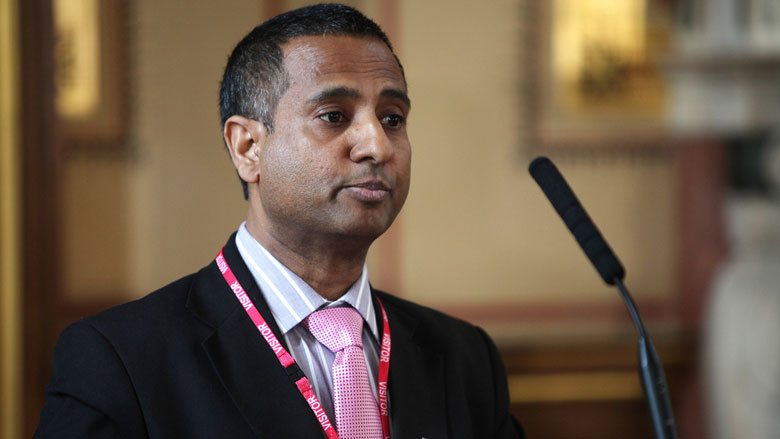Iran aiming to shut down UN investigator critical of its record
By CNS News | March 11, 2016, 6:42 EST
 (Courtesy of Flickr)
(Courtesy of Flickr) (CNSNews.com) – Iran is maneuvering with its allies at the U.N. Human Rights Council to block Western attempts to renew the mandate of a special investigator into Tehran’s human rights record – a man who has drawn contemptuous criticism from the regime for highlighting abuses.
For the past five years Ahmed Shaheed, a former foreign minister of the Maldives, has been an independent “special rapporteur” on Iran, and over that period Iran has denied multiple requests for him to visit the country.
At the HRC session now underway in Geneva, Shaheed is presenting areport that highlights abuses including a 20-year high in executions – almost 1,000 in 2015 – a “widening crackdown on freedom of expression and opinion,” and mistreatment of religious minorities such as Baha’i and Christian converts from Islam.
The council will debate the report on Monday, and then on March 24, the final day of the four-week session, Shaheed’s mandate will be up for renewal.
Iran’s diplomats are urging allies to oppose an extension, even as Iranian human rights activists will visit next week to lobby in favor of it. Forty political prisoners in Iran have reportedly signed a letter calling for Shaheed’s mandate to be renewed.
When the HRC session opened last week, Iran’s state human rights council chief Javad Larijani met with several visiting ministers, calling for support.
At a meeting with South Africa’s deputy foreign minister Larijani stressed Iran’s opposition to Shaheed’s mandate renewal, charging that Iran has “become a victim of politicization by major powers.”
“Appointing a human rights rapporteur for Iran, which has the biggest democracy in the region and enjoys relevant and precise rules and regulations, makes no sense at all,” he said.
“It is irrational and unfair as there are countries in our region which are miles away from democracy but still their human rights situation is never mentioned,” Larijani added, likely in reference to Saudi Arabia, which is a current member of the HRC.
Venezuelan Foreign Minister Delcy Rodriguez, who also met with Larijani, pledged to secure the support of fellow Non-Aligned Movement (NAM) and Latin American members of the council for an end to Shaheed’s mandate.
She said Venezuela believed it unfair to appoint a rapporteur to investigate “any country.”
Venezuela, like other NAM countries as well as members of the Organization of Islamic Cooperation (OIC), opposes country-specific mandates on principle, and in a 2007 victory those blocs managed to kill the mandates of special rapporteurs for Cuba and Belarus.
The one exception to that opposition is the case of Israel: The HRC’s predecessor created a special rapporteur for the Palestinian territories in 1993, and unlike others that expire, it is mandated to run “until the end of the Israeli occupation.”
The OIC wields a lot of influence in the 47-member HRC, and the establishment of Shaheed’s mandate was only possible in the first place because a group of OIC members, led by Iran’s regional rival Saudi Arabia, abstained rather than voting no in 2011.
The measure passed by a 22-7 vote, with 14 abstentions. Opposing it were China, Cuba, Russia, Pakistan, Ecuador, Mauritania and Bangladesh.
‘Copy and paste’
Iranian officials have long criticized Shaheed and his reports.
Last October, Iranian representative Forouzandeh Vadiati told the U.N. General Assembly his annual report was “biased and non-constructive” and “ignores all realities in my country,” and that appointing him in the first place was “a pure political move, unjustifiable, insincere and totally counterproductive.”
Three months earlier, Larijani accused Shaheed of simply reproducing allegations against Iran from other sources.
“This man has turned into an actor of the media involved in anti-Iran propaganda campaign,” he said. “Ahmad Shaheed says they don’t let him visit Iran. You copy and paste information from other sites and why do you want to come to Tehran?”
When Shaheed made allegations about extrajudicial executions last May, the Iranian judiciary’s human rights council called the claims “phony and baseless.”
And after he presented last year’s annual report, Iran’s foreign ministry dismissed it as “far-fetched” and “biased.”
Next week, Iranian human rights activists will visit Geneva to urge the council to renew Shaheed’s mandate
They include Europe-based musician Shahin Najafi, who has been target of several fatwas calling for his death for apostasy, women’s rights activists Maryam Faghihimani and Darya Safai, and human rights journalist Leili Bazargan.
Meanwhile the exiled National Council of Resistance of Iran (NCRI) opposition group reports that 40 political prisoners in Iran in a letter to the HRC called for a mandate renewal, saying Shaheed’s work has had some impact inside the regime’s prisons.
“There have been many instances that prisoners have been summoned because of his reports and despite the insults and accusations, the issues [raised in the reports] have been considered to some extent,” the letter said. “This would not have been possible without his reports.”
— Written by Patrick Goodenough










